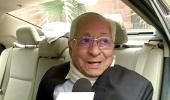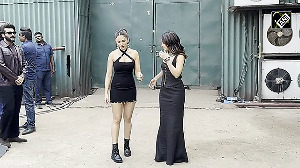'The intellectual A G Noorani and A G Noorani the family man sound like a contradiction in terms, but both aspects were integral parts of the individual.'

A G Noorani, the last of the titans who acclaimed the primacy of the Constitution in his countless articles, passed into the ages last week.
For decades, Mr Noorani deconstructed events and issues confronting the Republic with his encyclopaedic knowledge of the law and the Constitution in articles for a wide variety of publications.
Unknown to his friends and critics, there was a hidden side to Mr Noorani. The devoted family man, the loving uncle.
In this conversation with Syed Firdaus Ashraf/Rediff.com, Fawzia Madni, Mr Noorani's niece -- who is currently a consultant, development at the National Centre for Performing Arts in Mumbai and former associate vice president at the The Times Of India group -- reveals glimpses of the legend few knew.
Little is known about the family man that Mr Noorani was. Could you share some personal insights about your uncle?
There was a side to him which was very private, which only family members were exposed to.
His family meant the world to him.
The intellectual A G Noorani and A G Noorani the family man sound like a contradiction in terms, but both aspects were integral parts of the individual.
A bachelor, he regarded his sister's -- my mother's -- children as his own. He was always engaged with their lives but never made decisions for them.
He gave me access to his membership of the J N Petit library from where I borrowed reference books as a student. He would get my examination results from the Indian Express the night before they were published in the newspaper and celebrate my success with the family.
(Editor's note: To the present generation who may be unaware, university results were once published in the newspapers.)
He had an amazing affinity with children, which you will find surprising.
His stern demeanour was never a deterrent to kids in the family who were instantly drawn to him.
On the intellectual front, how do you recall him, as he is well known for the many article and books that he wrote?
He will always be first, Gafoormama, the indulgent uncle. My fondness for him was combined with admiration, deep respect and, indeed, awe of his intellect and achievements.

Did he ever speak to you about the communal politics in India?
Human and individual rights, secularism, democratic principles meant a great deal to him. His sense of right and wrong were black and white.
Indeed, his values defined him. Members of his family imbibed all of that from him.
He was very much a moral compass when it came to values.
A lot of his critics said he was anti-Hindu and I did read two-three nasty posts about him online after his death. False! He was a true secularist.
He was in Class 11 at the height of the freedom movement and was completely immersed in it.
His school principal did not allow him to sit for the SSC exam as he believed he had neglected his academic studies and wouldn't clear the exam.
My grandfather couldn't believe that his brilliant son who won a stack of prizes every year was denied a form to appear for his SSC exam.
His interest in politics remained undiminished and he cleared the SSC exam the following year.
The engagement with the freedom movement even at the cost of an academic year had value which endured all his life.

Is there anything else you recall with fond memories?
Yes, his love for food. He was a true gourmet. I used to head the international media marketing division at The Times of India group and would travel abroad three to four times a year.
I would bring back chocolates and packaged foods that I thought he'd enjoy and he did!
He was happiest when I visited Oriental countries because he loved their cuisine.
How will liberal and secular India remember him since he stood for those values all his life?
They will remember him as somebody who stood for a set of values -- sadly, those values are being eroded.
I wonder if, down the line, future generations will recognise those values at all.
Was he hopeful for a secular India?
He was very hopeful because he was an idealist. He still felt that course correction could right the wrongs that had happened.
My personal feeling though is that there was more hope than reality to that.











 © 2025
© 2025